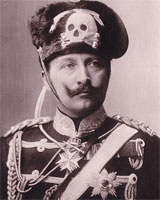IN JANUARY 1889, AUSTRIAN EMPEROR FRANZ JOSEPH WAS COMPROMISED WHEN
HE ORDERED THE ASSASSINATION OF HIS OWN SON, CROWN PRINCE RUDOLPH. |
After the murder of his own son, Emperor Franz Joseph was the perfect puppet, and puppetmasters Winston Churchill and Kaiser Wilhelm II used him to ignite World War I.
The bloody conflict began in August 1914, and it was the precursor to World War II.
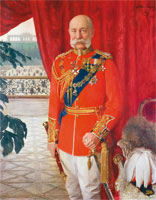 Emperor Franz Joseph (1830–1916). Misruled Austria from 1848 to 1916. |
|
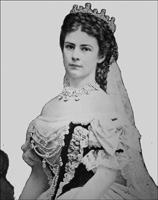 Empress Elizabeth (1837–1898). |
Arch-reactionary Emperor Franz Joseph was a firm believer in the Syllabus of Errors of Pope Pius IX, and he considered electricity, trains, telephones, and newspapers the "work of the devil."
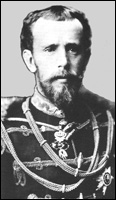 Crown Prince Rudolf (1858–1889). |
|
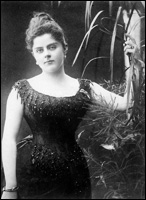 Mary Vetsera (b. 1871). |
Mary Vetsera was the Austrian Marilyn Monroe, but unlike Marilyn, she lived to a ripe old age!
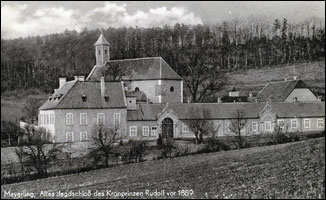 The Mayerling Lodge where the Crown Prince was assassinated. |
|
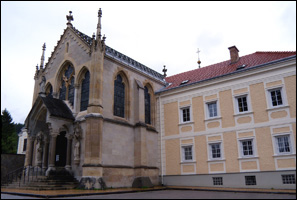 Franz Joseph built a Carmelite convent on the site of the Mayerling Lodge. |
After the assassination, the unbelievable happened, Austria began to embrace Prussia diplomatically, and the 2 bitter rivals became allies aimed at Russia.
The 84-year-old Emperor Franz Joseph ignited World War I
Even though the 2 countries spoke the same language, Prussia and Austria were always deadly rivals. In 1866, Austria made an exception to their rule "make love (to your cousins) and not war" and they went to war with Prussia. They were soundly defeated at the Battle of Königgrätz, and they planned on regaining territory lost to Prussia.
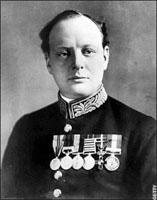 Warlord Winston Churchill (1874–1965). Misruled Britannia from 1914 to 1965. |
|
The assassination of Archduke Ferdinand was blamed on the Serbs. The Emperor sent an ultimatum to the Serbs, which he knew they would refuse. Their rejection of the ultimatum was his excuse to ignite the Great War.
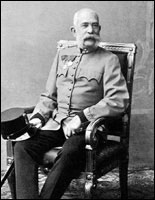 The "dinosaur" in 1914. |
|
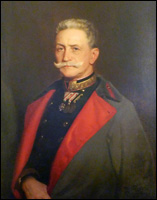 Field Marshal Franz Von Hötzendorf (1852–1925). |
Unfortunately for the Emperor, his dream of a quick victory over Serbia and Russian was soon gone with the wind.
Field Marshall Helmuth von Moltke was fearful of the prospect of Russian troops entering Berlin while he entered Paris. As a result, he lost his nerve, and moved as many as 275,000 soldiers back to East Prussia. Here is an account of that history-changing event from "Kaiser Bill's" cousin Winston Churchill:
And at that culminating moment the Russian pressure began to produce substantial effects. Honour must ever be done to the Tsar and Russian nation for the noble ardour and loyalty with which they hurled themselves into the war. A purely Russian treatment of their military problem would have led the Russian armies into immediate withdrawal from their frontiers until the whole of their vast mobilization was completed. Instead of this, they added to a forward mobilization an impetuous advance not only against Austria but against Germany. The flower of the Russian Army was soon to be cut down in enormous battles in East Prussia. But the results of their invasion were gathered at the decisive point. The nerve of the German Headquarters failed. On August 25 two army corps and cavalry of the German right were withdrawn from France. On August 31 Lord Kitchener was able to telegraph to Sir John French "Thirty-two trains of German troops were yesterday reported moving from the western field to meet the Russians." (Churchill, The World Crisis 1911–1918, p. 147).
That withdrawal of troops from France caused "Dead Head" to fire von Moltke a few months later. As revenge for saving Christian civilization from the Prussians, Tsar Nicholas II was titaniced just 4 years later.
A bitterly disappointed Emperor Franz Joseph went to meet his Maker in 1916.The dogs of war that he unleashed eventually caused the deaths of over 50 million souls. That war was just a prelude to another much greater conflict that was to erupt just over 20 years later!
Vital Links
References
Churchill, Winston S. The World Crisis 1911–1919. (Abridged version, originally 5-volumes).Charles Scribner's Sons, New York, 1929.
Greg King & Penny Wilson. Twilight of Empire: The Tragedy at Mayerling and the End of the Habsburgs. St. Martin's Press, New York, 2017.
Haslip, Joan. The Lonely Empress: Weidenfeld and Nicolson, London, 1965.
Haslip Joan. The Emperor and the Actress: the Love Story of Emperor Franz Joseph and Katharina Schratt. Dial Press, New York, 1982.
Judtmann, Fritz. Mayerling: The Facts Behind the Legend. George G. Harrap & Co., London, 1968.
Listowel, Judith. A Habsburg Tragedy: Crown Prince Rudolf. Butler & Tanner Publishing, London,1978.
Longo, James. Hitler and the Habsburgs: The Führer's Vendetta Against the Austrian Royals. Diversion Books, New York, 2018.
Markus, Georg. Crime at Meyerling: The Life and Death of Mary Vetsera. Ariadne Press, Riverside, California, 1995.
Wawro. Geoffrey. A Mad Catastrophe; the Outbreak of World War I and the Collapse of the Habsburg Empire. Basic Books, New York, 2014.
Wolfson, Victor. The Mayerling Murder. Prentice-Hall, New Jersy, 1969.
Copyright © 2019 by Patrick Scrivener
